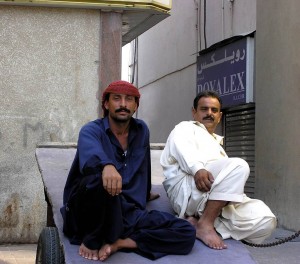Heat Stress and Ramadan
Jun 16th, 2014 | By Sanaa Chakibi | Category: Health and Safety
With a harsh arid climate and summer temperatures that can reach 60° Celsius (140° Fahrenheit) between the months of May and September, Middle Eastern countries face a continuing challenge of how to conduct outdoor work without subjecting their workers to the harmful effects of heat stress. This year that challenge will be even greater with the occurrence of Ramadan, which requires fasting between sunrise and sunset, during the month of July. Employers should make plans now to protect their workers from heat stress during Ramadan.
Ramadan
The word Ramadan comes from the Arabic root ramiḍa or ar-ramaḍ, which means scorching heat or dryness. Ramadan is the ninth month of the Islamic calendar, and its annual observance is regarded as one of the Five Pillars of Islam. The month lasts 29 to 30 days based on the visual sightings of the crescent moon, and the dates of observance vary annually when compared to the Western calendar. Muslims worldwide observe Ramadan as a month of fasting, prayer, and increased charity. Fasting is fard (obligatory) between sunrise and sunset for adult Muslims, except those who are ill, traveling, pregnant, breastfeeding, diabetic, or menstruating. While fasting, Muslims refrain from eating, drinking, and smoking.
In some Muslim countries, failing to fast, or, eating and drinking in public during the days of Ramadan are considered crimes that can be prosecuted by the authorities. To address the tension between religious observation and the demands of the workplace, some countries have enacted laws that amend work schedules during Ramadan.
Work Restrictions in the Middle East
Many Middle Eastern countries have taken steps to prohibit work between the hours of 12:00 p.m. and 3:00 p.m. These restrictions were much needed, but they will continue to prove insufficient if not coupled with an effective enforcement system. The heat in this region during the hot months is so extreme that unprotected exposure can be fatal.
To better understand the work laws that have been implemented in the Middle East, a summary of work restrictions in Qatar and the United Arab Emirates with an evaluation of the effectiveness of the restrictions is provided below.
Qatar
Overview: Qatar adopted Ministerial Decree No. 16 of 2007, which stipulates that working hours outdoors must be limited during the summer months. Specifically, the Department of Labor prohibited the employment of workers for more than five hours in the morning (with morning work to end by 11:30 a.m.) and stated that evening working hours must not start before 3:00 pm. No specific measures were adopted regarding fasting in the heat.
Evaluation: Enforcement in Qatar is still lagging behind, and fatalities due to heat stress have been reported by news sources. Some critics have also pointed out that Qatar still does not publish information on occupational injuries, a situation that raises many questions.
United Arab Emirates
Overview: In May 2012, the Minister of Labor imposed a country-wide ban on outdoor work between 12:30 p.m. and 3:00 p.m. during the summer months. Employers are now required to display working hours and provide appropriate rest areas and protection against the risks of heat. The Ministry of Labor is constantly increasing its inspection campaign, and any violations of the rules for heat stress prevention are penalized by fines or even site shutdowns. No special provisions have been made for workers who are fasting during Ramadan.
In Abu Dhabi, the Health Authority-Abu Dhabi; Abu Dhabi Environment, Health, and Safety Management System; Abu Dhabi EHS Center; and sector regulatory authorities are working together to reduce and prevent heat related illness in the workplace through implementation of the Safety in Heat program. Started in May 2009, the Safety in Heat program supplements and supports the requirements of the Abu Dhabi Environment, Health, and Safety Management System (AD EHSMS) Code of Practice for safety in heat. Other Emirates have implemented similar measures.
These safety in heat regulations usually require employers who have workers performing activities in the sun to have available first aid kits, drinking water (sometimes water with electrolytes), and a means of preventing direct exposure to sunlight.
Evaluation: Despite proactive regulatory requirements, ongoing regulatory enforcement, and information campaigns designed to educate workers and employers on the dangers of heat stress and recommended actions for safe work, the fact remains that if during Ramadan eating and drinking are prohibited between sunrise and sunset, workers will not be able to safely perform their outdoor tasks.
Recommendations for Working in Heat
To prevent heat-related illnesses and fatalities, the Safety in Heat Program makes the following recommendations:
- Drink at least 2 liters of water every 2 to 3 hours.
- Add a little more salt to meals in summer to replace salt lost in sweat.
- Slow down and rest in very hot weather conditions.
- Get plenty of sleep and rest at night.
- When you feel unwell tell your supervisor or the work clinic, if you have one.
The U.S. Department of Labor Occupational, Safety and Health Administration (OSHA) provide the following additional recommendations:
- Drink water every fifteen minutes, even if you are not thirsty.
- Rest in the shade to cool down.
- Wear a hat and light-colored clothing.
- Learn the signs of heat illness and what to do in an emergency.
- Keep an eye on fellow workers.
- Adopt an “easy does it” attitude on your first days of work in the heat. You need to get used to it.
Conclusion
There is no way around the fact that workers who conduct strenuous work tasks in a hot environment are subject to heat stress, heat-related illnesses, and possibly death unless proper precautions are taken. If workers are unable to eat or drink during the work day while observing Ramadan, then employers have a moral obligation to modify the work requirements to protect their workers. Given the harsh environmental conditions of the region, it is also recommended that governmental authorities in all jurisdictions review their bans on outdoor drinking for workers who have no religious obligation to fast. The authorities should also prohibit those who are fasting from performing any outdoor work.
Other Articles EHS Journal Articles by Sanaa Chakibi
Saudi Arabia Releases 9 New Environmental Laws
Saudi Arabia: Ambient Water Quality Standards
About the Author
 Sanaa Chakibi is a regulatory expert with 7 years of experience in regulatory consulting to multinational companies with offices in the Middle East and North Africa (MENA) region. She is the founder of Sanaa Chakibi Consulting, a MENA-region regulatory compliance consultancy. Ms. Chakibi consults on regulatory compliance programs in the MENA region with a focus on environmental, health, and safety (EHS) issues. Services provided to companies and foreign governments include EHS regulatory developments, EHS forecasts, and analyses of applicable regulatory requirements for specific EHS issues and products in the MENA region.
Sanaa Chakibi is a regulatory expert with 7 years of experience in regulatory consulting to multinational companies with offices in the Middle East and North Africa (MENA) region. She is the founder of Sanaa Chakibi Consulting, a MENA-region regulatory compliance consultancy. Ms. Chakibi consults on regulatory compliance programs in the MENA region with a focus on environmental, health, and safety (EHS) issues. Services provided to companies and foreign governments include EHS regulatory developments, EHS forecasts, and analyses of applicable regulatory requirements for specific EHS issues and products in the MENA region.
Ms. Chakibi is a native speaker of Arabic, French, and English, which enables her to efficiently analyze, draft, and edit regulatory documents in any of these languages. She has established contacts in the EHS field in Saudi Arabia, Algeria, Morocco, Qatar, Kuwait, and Egypt.
Photograph: Working Men in Dubai by Mark Karstad, Edmonton, Alberta, Canada.
Return to the EHS Journal Home Page


Good day,
this article was on heat stress and Ramadan. Your recommendations are for work in a heat stress environment but NOT for one who is fasting as this person cannot drink every 2 to 3 hours. Can you please look at guidelines for fasting workers . thanks.
[…] countries, including Qatar and the United Arab Emirates, have placed restrictions on people working outdoors during the summer because of the high heat. Some of the restrictions […]
EHS Journal is a good source of information and update for EHS Professionals, I appreciate all the efforts in this regard. Can I get the EHS Journals and other EHS Updates through my email.
Thank you.
Regards,
Dr Imtiaz Ahmed
Big thanks for your share